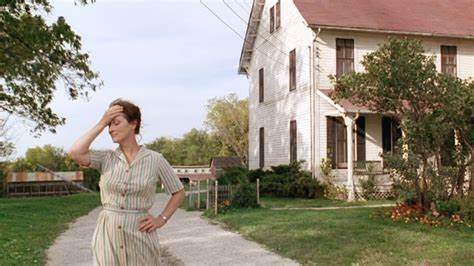This movie contains complex issues such as society, family, women, and sexuality, and has a certain depth. This article will be introduced from the perspective of the protagonist’s mid-life crisis. Although the mid-life crisis breaks out in middle age, it is by no means a temporary problem, but the meaning of the entire life suddenly collapses at this time. If you are still young or have entered middle age, I hope it can bring you some inspiration.
Middle-aged men in movies
Lester is a 42-year-old man who feels his heart is dead. He “masturbates” when he gets up every morning and takes a shower. “This is the only orgasm I have every day, and it goes from bad to worse after that,” he said. Lester felt like he was missing something, but didn’t know what it was, just that he felt “lifeless.”
His wife, Caroline, is a delicate lady who works very hard for her career and must maintain her “successful” image in front of her neighbors and peers. “I see her and she’s tired, she wasn’t like this before, she was happy, we were happy,” Lester said.
His daughter Jenny, their only child, was “cynical, wandering and confused.” In adolescence, she lacked self-confidence. Her best friend Angela bragged about how many men she had slept with all day long, which made Jenny, who was not paying attention, doubt herself even more. “I wanted to tell her that tomorrow would be better, but I didn’t want to lie,” Lester said.
Their daily life is about “success”. Caroline, as the main contributor to the villa and luxury cars, is condescending to Jenny and disappointed and disgusted with Lester. Jenny also doesn’t like her incompetent father Lester. The reality of this middle-aged man is worrying.
In middle age, this man has reached an embarrassing situation in his life. He is at a loss as to what to do and his family is full of conflicts.
Jung was the first to put forward the theory of “midlife crisis”. He believed that around the age of forty, a person’s external development reaches a certain level and conflicts with internal development needs, resulting in a psychological adaptation crisis.
The origin of the crisis
In the play, Lester is doing a mundane job that he doesn’t like, but he still does his duty. The new boss used the industry downturn as an excuse to cut expenditures and squeezed out Lester, who was young and had a high income. This made Lester, who was already disgusted with the bosses’ profligacy and corruption, very angry and helpless.
To maintain a stable income, Lester compromised with reality. He suppressed his disgust for the boring job and the corrupt life of his boss. But reality did not let him go because of his compromise. Lester felt that it was unfair for him to bear the responsibility for the company’s problems, and finally couldn’t help but voice his dissatisfaction.
During dinner, Jenny and Caroline had a quarrel over the music played, and Jenny left the table disappointed. Lester couldn’t stand Caroline’s condescension, and knowing that his daughter hated them both for having too little company, he ran to apologize to Jenny. As a result, the father and daughter who used to talk about everything ended up in a quarrel because they couldn’t understand each other.
Behind a seemingly ordinary family quarrel is the presentation of relationship problems. Caroline was busy with work for a long time and ignored Jenny’s feelings. Their communication was more like a kind of dominance, and Jenny was not allowed to have objections. Lester was the same, he only had a handful of time to spend with Jenny, and Jenny also felt resentful towards her father.
Applying Jung’s three important archetypes “Personal Mask”, “Shadow” and “Self” to interpret middle age, the process of people growing up is the process of gradually putting on masks. The “mask” mentioned here is not derogatory. The mask is the most superficial layer of personality. It is precisely the mask that allows us to better integrate into society and help us adapt to the outside world.
However, where there is light, there is shadow. Jung’s “shadow” is the deepest layer of personality, the repressed part hidden deep in our hearts. In reality, people suppress their emotions about the unfairness of life and their emotions towards family members. Over time, if the shadow area is too large, the stability of the personality will be broken.
Lester finally got tired of the mask he had worn for so long when he encountered setbacks at work. At this time, he had been absent from his daughter’s life for a long time, creating a shadow that he was unwilling to accept. However, when you wear a mask for too long, it becomes difficult to take it off and people around you may feel uncomfortable. So Jenny didn’t buy Lester’s apology. Instead, she thought he was acting, and the shadow continued to grow.
Outbreak of crisis
The crisis itself has both “danger” and “opportunity”. If a person has no awareness and follows social rules like a zombie, there will be no crisis. It happens that some people still maintain the fire of awareness. When the personality becomes unstable, people will begin to integrate themselves.
The “self-nature” archetype that Jung calls is the archetype of all archetypes, that is, the overall personality. Self-individuation is to become oneself. The process of individuation begins with showing “rebellion” and finding the “lost” part of oneself.
Lester was forced by Caroline to watch Jenny’s cheerleading performance together, and Caroline said it was very important to Jenny. Lester knew that Jenny had given up hope on them, and he didn’t want to do such a formal and hypocritical act in his heart, but he came reluctantly due to the pressure from Caroline.
During the cheerleading performance, Lester accidentally noticed Jenny’s classmate Angela and was deeply attracted. His eyes did not move away from Angela until the last moment. After the show, Lester saw Jenny and Angela and happily greeted Angela incoherently.
Lester’s heart, which had been closed for a long time, seemed to be loosened at this moment. He thought he had found the missing piece, and from then on, Lester no longer tolerated anyone, anything, and anything he wanted. The little bit of fire that Leicester retained was completely ignited.
In the next few days, Lester kept thinking about Angela and stole Angela’s phone number from Jenny. When attending a party with Caroline, they met Ricky, a neighbor boy who sold marijuana and started smoking marijuana.
It happened that Angela came to live with Jenny at home one day. Lester eavesdropped on the conversation between the two and heard Angela and Jenny saying that Lester was cute and would be sexy if he exercised his body. They bragged that if Lester had muscles, he would have sex with him. Go to bed.
Lester works out every day, smokes marijuana, and secretly masturbates in bed at night. After being discovered by Carolyn, Lester can no longer swallow his anger and begins to quarrel with Carolyn, even threatening divorce and dividing her property. By threatening to accuse company leaders of soliciting prostitutes, he successfully obtained a large severance package and bought the Firebird sports car he had dreamed of when he was young.
As Heidegger said in “Being and Time”, “People are obsessed with pursuing the enjoyment of material life, but they are unable to understand the meaning of their existence. Only through ‘death’ can we realize the true existence of human beings.”
The end of a person’s life is “death”, and the family’s irreconcilable conflicts and collapse are also “death”. It was precise because Lester felt lifeless that he had a strong desire for “life”. Angela happened to be Lester’s lifesaver.
Lester escapes the oppression of the real world and turns to fantasy for comfort. Freud said in “The Creator and Daydreaming” that man satisfies himself by creating “a world of his own, or in other words, by rearranging the things in his world in a new way.”
Self-redemption
When a middle-aged person is overwhelmed by life and loses himself, he will perish; when a person encounters his incompleteness, he will be saved. Lester falls into the latter category.
One rainy night, Angela came to Lester’s house, ready to sacrifice herself for him. When Lester finally meets Angela, whom he’s been waiting for, and starts kissing her and taking off her clothes, Angela nervously says it’s her first time and she’s worried she won’t do a good job. Hearing this, Lester hesitated for a moment, then slowly stood up and put on Angela’s clothes.
Angela thinks Lester doesn’t like her, so she cries and asks Lester if he’s not good enough. At this time, Lester is no longer facing the slutty and sexy girl, but a child who is a little unsure of himself like his daughter Jenny. Lester asked her how Jenny was doing, was she happy? sad? She said that Jenny fell in love with the neighbor boy Ricky and was very happy. Lester smiled happily.
After experiencing rebellion, individuation manifests as “acceptance.” Lester finally got the chance to sleep with Angela, but was moved by Angela’s “confession”. At this time, he is no longer the rebel who wants to vent his desires, but a protector who knows how to cherish.
When Lester saw Angela’s hidden “incompleteness”, he also saw his own “incompleteness”. At this time, he who originally escaped from reality suddenly realized the beauty of life, accepted the “incomplete” Angela in reality and also accepted himself.
The ending of the movie is quite dramatic. Navy Lieutenant Colonel Fitz, who had always misunderstood that his son Ricky was providing homosexual services to Lester, walked into Lester’s home with a gun and shot Lester in the head. At the last moment of Lester’s life, he smiled and looked at the group photo of his family of three, recalling his youthful years.
The breakdown of life
Seeing this, some people must think that although Lester found hope in rebellion, he did not save his life and even lost his life, which is not worth it. People talk about childhood play, poor youth, promising youth, success in middle age, and happiness in old age. Does such an ideal life actually exist?
I think everyone has different qualifications and different circumstances. If you insist on pursuing a life that everyone can recognize, it will be risky. This risk may not be as exaggerated as Lester’s. After all, movies are an artistic means of expressing conflict, but anyone who has experienced a midlife crisis must know that the turbulence in their hearts is enough to make people sleepless and sleepless.
Not only do we have to face life, we also face death. In this endless reincarnation, what is the meaning of life?
Some people choose career, some choose family, some choose society, and some choose self. Lester and Caroline did the same, each made their own choice. The reason why we can have choices is because life is meaningless. People give meaning to life through choices. Since it is given, good or bad is relative.
Cherish what you have, strive for what you want, don’t forget the existence of yourself, and always maintain awareness of yourself, so that you will not be at a loss in middle age. Only by not being attached to the expectations of most people can you avoid incurring family debts that you cannot afford to repay in middle age, and can you enjoy the inner wealth that natural production brings to us.




